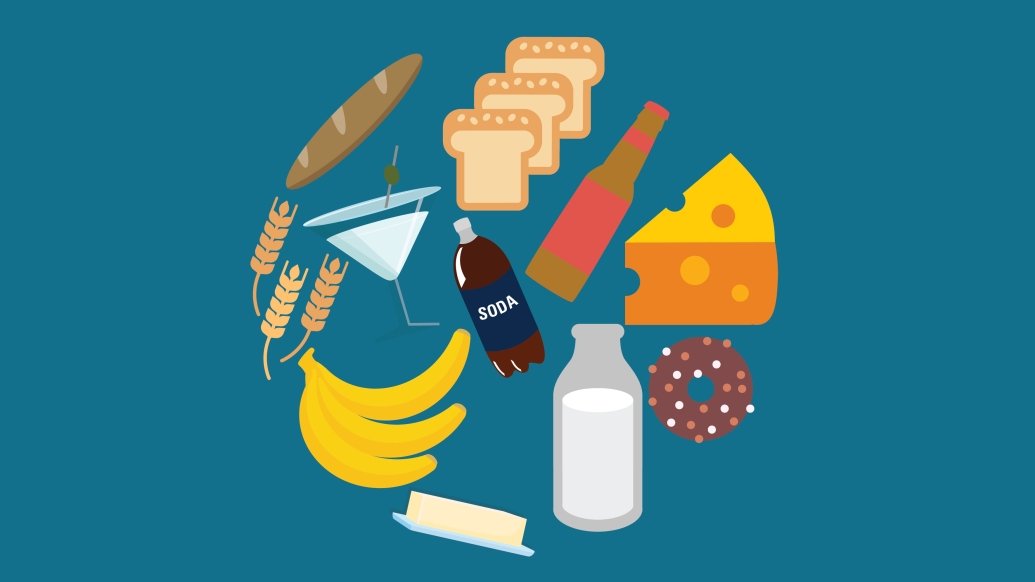Cutting out food groups is a proven means of identifying allergies and sensitivities. But it isn’t a safe (or effective) way to drop pounds, a U-M expert says.
7:00 AM
Author |

The foundation of dieting has always been diligence and moderation. Elimination diets, growing in popularity, are no different.
MORE FROM MICHIGAN: Sign up for our weekly newsletter
But instead of simply shrinking portion sizes or eating more veggies, such regimens cut out entire food groups, purportedly for health and weight loss.
Consider the popular Paleo diet, which permits only meats, nuts, vegetables and some fruits, eschewing grains, dairy, legumes and sugars. Or diets that exclude single food groups such as dairy or wheat — often without a medical reason to do so.
For some, elimination diets can help identify food allergies or sensitivities. The Low FODMAP diet — a complex trial-and-error process that removes carbohydrates assumed to prompt symptoms of irritable bowel syndrome — is designed to single out food triggers and reintroduce benign items over several weeks.
But for the rest of us, a categorical purge isn't the ticket to slimming down.
"It's not going to help you lose weight," says Amy Rothberg, M.D., DABOM, an associate professor of medicine and nutritional sciences at the University of Michigan. "Adherence to calorie restriction is particularly hard when the diet is so restrictive in certain macronutrients."
Side effects from the shift can be unpleasant: constipation resulting from a low-carb Paleo menu, for instance, or diarrhea following the start of a gluten-free diet heavy with insoluble fiber — which is why a dietitian should be involved before, during and after any type of change is pursued.
Rothberg spoke more about what dieters-to-be should know.
Why do people assume elimination diets promote weight loss?
Rothberg: People read about some new fad or craze — and they've usually tried something else and haven't succeeded. I think some of it may have arisen just from the popularity of the gluten-free diet. That probably translated into many other things.
People with allergies or sensitivities who have felt better by consequence [on various elimination diets] may have had some weight loss. So other people then say, "If that worked for you, it'll work for me."
There have always been elimination diets, we just haven't called them that. Certainly, vegetarian diets are a type of elimination diet.
How might such diets backfire or pose a risk?
Rothberg: People on gluten-free diets often gain weight. Many of the foods are actually calorie-dense.
SEE ALSO: What Happens to Your Body When You Stop Exercising?
People on vegetarian diets with the hopes of losing weight often replace what they have eliminated with high-calorie [junk] foods. In a way, there's some psychology there: If I've taken away something high in fat and calories [such as meat], I can replace it with this.
Vegan diets are, frankly, very restrictive. The worry about vitamin B12 deficiency in vegans, for example, is well-known. They do have to have supplementation.
Should people consult a doctor before trying one?
Rothberg: It depends how comfortable your primary care physician is talking about nutrition. There are physicians interested and have expertise, but they also can refer you to a registered dietitian who can provide supervision and counseling.
If someone cuts a food from his or her diet, is reintroduction dangerous?
Rothberg: I'm not sure we know the answer whether that will cause harm. People stop eating something — pizza, for instance. You might feel ill (after eating it again), but the truth is that people do this all the time. I don't think it's analogous to, say, discontinuing medications.
What diet do you most often recommend?
Rothberg: There is no magic to weight loss. It really is calorie restriction and eating things that are less calorie-dense — lean proteins, whole grains and vegetables.
Cut out the processed and packaged foods and refined sugars. I say this over and over, like a broken record.

Explore a variety of health care news & stories by visiting the Health Lab home page for more articles.

Department of Communication at Michigan Medicine
Want top health & research news weekly? Sign up for Health Lab’s newsletters today!





